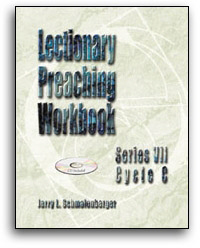SermonStudio
Fifth Sunday Of Easter
Preaching
Lectionary Preaching Workbook
Series VII Cycle C
Seasonal Theme
The resurrected Christ becomes a physical presence in the world again.
Theme For The Day
After Easter disciples love each other. It is also a witness to those outside the church who see it.
First Lesson
Acts 11:1-18
Peter's Report
The resurrected Christ becomes a physical presence in the world again.
Theme For The Day
After Easter disciples love each other. It is also a witness to those outside the church who see it.
First Lesson
Acts 11:1-18
Peter's Report


